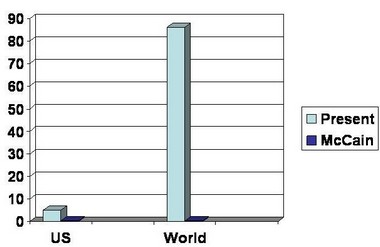How much oil?
no matter what,
it ain't enough
it ain't enough
 Hanging out socially with bikers and professionally with environmentalists, I've observed their almost giddy satisfaction with rising gas prices. Even some muscular liberals, despite being burned on the Iraq War, seem to think that working class families require exactly this bit of tough love to force them to be free from our Car Kultur.
Hanging out socially with bikers and professionally with environmentalists, I've observed their almost giddy satisfaction with rising gas prices. Even some muscular liberals, despite being burned on the Iraq War, seem to think that working class families require exactly this bit of tough love to force them to be free from our Car Kultur. Now comes the offshore drilling debate between Obama and McCain. Essentially it boils down to there's enough oil out there (McCain) vs. there may be BUT the issue is really about American consumption (Obama). A great way to understand the significance of the difference comes from Juan Cole's Informed Comment. Cole, a former prof of mine, is best known for his commentary on Middle Eastern affairs. However, given, the ocean of oil under those country's sandy wastes, he can't ignore its impact on current events. I really, really urge any biker or environmentalist to check out his blog. Here's a startlingly relevant example:
Now comes the offshore drilling debate between Obama and McCain. Essentially it boils down to there's enough oil out there (McCain) vs. there may be BUT the issue is really about American consumption (Obama). A great way to understand the significance of the difference comes from Juan Cole's Informed Comment. Cole, a former prof of mine, is best known for his commentary on Middle Eastern affairs. However, given, the ocean of oil under those country's sandy wastes, he can't ignore its impact on current events. I really, really urge any biker or environmentalist to check out his blog. Here's a startlingly relevant example:The world uses on the order of 86 million barrels a day of petroleum. That figure is expected to veer sharply upward as China and India go in for automobiles and trucking in a big way.
The United States uses nearly 21 million barrels a day of petroleum and liquified hydrocarbon fuel, or nearly 25% of everything the world produces daily. The US has 5% of the world's population.
The US produces about 5 million barrels a day of petroleum and another 3 million barrels a day of liquefied fuel. That 8 million barrels a day is only about a third of what we use, so we import the rest. The lower 48 states produced about 4.4 million barrels of petroleum a day in 2006.
If all the known offshore fields were drilled and panned out, the lower 48's oil production would be increased by 7%. That would be 300,000 barrels a day.
Millions of barrels of oil a day produced by US and by world, with McCain's proposed increase through offshore drilling.
0.3 million barrels a day would make very little difference whatsoever to current oil prices even if it could be brought online right now. It would be a matter of a few pennies. And, in fact, if there were to be any impact of all of offshore drilling on prices, it would not come until 2020 or even 2030.
You will note that the Saudis just offered to increase their production by 0.5 million barrels a day, and the oil futures market just yawned. And that is in the real world, right now, not in some decade or two-decades-out in the future drilling scheme.
Moreover, US consumption of petroleum is increasing over time, so the extra 300,000 barrels a day would quickly be used up and then some.
McCain is cynically wooing Big Oil in Texas in order to get campaign contributions, while lying to the American people about his offshore drilling plan having a quick impact on oil prices and their quality of life. Bringing the 300,000 barrels a day on line would make somebody a lot of money. It will do us no good with regard to energy prices, and in fact will harm our standard of living because drilling for the oil will endanger beaches and the environment more generally, and burning that extra oil will accelerate climate change.
An informed reader writes, "We can save more than 300,000 barrels a day by everyone in the US using just one sixth of a gallon less a day. The US did it in WW2, why not in the War on Oil?"
It isn't even a matter of just voluntarily using less. If the US depended more on trains and increased automobile and truck fuel efficiency, it could reduce its use of petroleum by millions of barrels a day, which would have a stupendous impact on oil prices compared to what could be achieved from offshore drilling. Rail is much more efficient at transporting goods than trucking. Trucking in the US receives very substantial hidden subsidies. Trucks tear up the highways in ways that passenger automobiles do not, so the hundreds of millions of dollars the government spends on road repair every year, which you pay for with your tax dollars, is effectively a vast subsidy to trucking companies. If that subsidy were cancelled, or given to the railroads, and trucking companies had to actually pay the cost in carbon production and road repair generated by their industry, the US would be light years closer to energy independence. It is Congress, which is bribed by campaign contributions from concrete and trucking concerns, that has set up this ridiculous system of hidden subsidies that harms us all. Moreover, Detroit's silly resistance to fuel efficient automobiles will bury the US car industry, as the world turns to vehicles produced by the Japanese or Europeans that are much cheaper to run. And Congress coddles them on all this.
"Redshift" notes below,'To add to his new energy policy instanity, McCain is a longtime opponent of Amtrak. He's actually worse than Bush in this area. In the "differences" column of the recent NYT chart comparing Bush and McCain on policy, this is noted under "Federal spending":McCain is not against Federal subsidies for commuter airlines, on which Arizonans depend.
"Mr. McCain has sought to emphasize his differences with Mr. Bush by portraying himself as a stronger opponent of pork-barrel projects and other wasteful spending. He says he would not sign any earmarked projects into law and would cut financing for ineffective programs, including Amtrak." '
It is estimated that Federal subsidies for highways annually amount to $500 an automobile, while subsidies for Amtrak amount to only $40 a passenger.
(Since rail is also more efficient in moving passengers than automobiles, and since automobiles account for a significant proportion of US petroleum use, opposing subsidies for Amtrak while spending billions in public money to build and repair roads for autos is suicidal.)
But I have a sinking feeling that the Democrats will have no effective answer to McCain's cynical offshore drilling ploy. Developing a Green rhetoric that is convincing to the public is the most essential political task of our generation, and of tremendously more import than terrorism or war.
Labels: cagers, Election 08, enviromatters








4 Comments:
Hey thanks a lot for the link. I like the outlook your blog has taken. I work closely with oil clients. As much as everyone complains about demand, the problem is also on the supply side.
You're quite welcome. And I found this over at today's NYTimes:
CLIMBING ON BOARD
On the Web site of Foreign Policy magazine, one of the reasons to love $4-a-gallon gas is explained.
From 2000 to 2005, fewer than 5 percent of Americans used mass transit for their commutes, compared with about 50 percent in Japan and Europe. But that may be changing. More U.S. commuters than ever are taking buses, subways, or light rail to work instead of driving their cars. ... It’s not rocket science. For many, a roundtrip bus or metro fare is easier to stomach than gas prices that in some places have climbed to $4.79 per gallon. Three-quarters of Americans now believe more money should be spent on developing and improving mass transit systems, and cities are responding. Expansion and renovation projects are in the works for Southern California, New York, Philadelphia, Seattle and Washington, D.C. Europe, meanwhile, is taking transit to the next level: Paris, which has been updating its light-rail network, is installing energy-efficient trains on several Métro lines, while London plans to increase its system’s overall capacity by 50 percent by 2022.
It's difficult to think of this guy as "informed" when he leads off like this: "The world uses on the order of 86 million barrels a day of petroleum. That figure is expected to veer sharply upward as China and India go in for automobiles and trucking in a big way."
He's writing like a classical economist who believes demand will automatically and always increase the supply, regardless of how limited a resource is.
China & India have already gone for autos in a big way, but production has not increased to meet that new demand. Oil production has remained essentially flat since 2005 in spite of record spending for expoloration and drilling around the world.
Beckoning was the bicycle boulevard with some attractive models in the shop window seen pedalling with passion. The shop assistant spots me eyeing the beauties and says, "You have come to the right place. We have fuel-saving, actually no-fuel, bicycles to combat the fuel hike," he informs.
-----------
micheel
buzz marketing
Post a Comment
<< Home